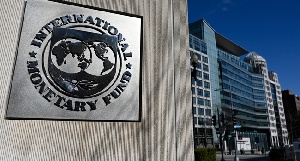Business News of Wednesday, 16 April 2025
Source: www.ghanawebbers.com
Editorial: Fourth review unlocks about US$370million
Last year, growth exceeded expectations. This was mainly due to strong mining and construction sectors. However, program implementation struggled before December's elections.
Key challenges include unpaid obligations and high inflation. Reforms in energy and finance have also been postponed.
Since January, the new administration has taken bold measures. IMF officials noted these actions realign the program with its goals. The government has strengthened fiscal policies, raised electricity tariffs, and tightened monetary policy.
Preliminary IMF assessments show a primary fiscal deficit of 3.25 percent of GDP by end-2024. This is far from the planned surplus of 0.5 percent.
The deficit resulted from unbudgeted expenditures. In response, the government is auditing payables with help from the Auditor General and two international firms.
Once approved by the Executive Board, Ghana will receive its fifth disbursement under the program. This will bring total IMF receipts to US$2.3 billion.
The current program, approved in May 2023, aims to restore debt sustainability. It also seeks to support economic recovery and protect vulnerable populations through targeted social spending.











